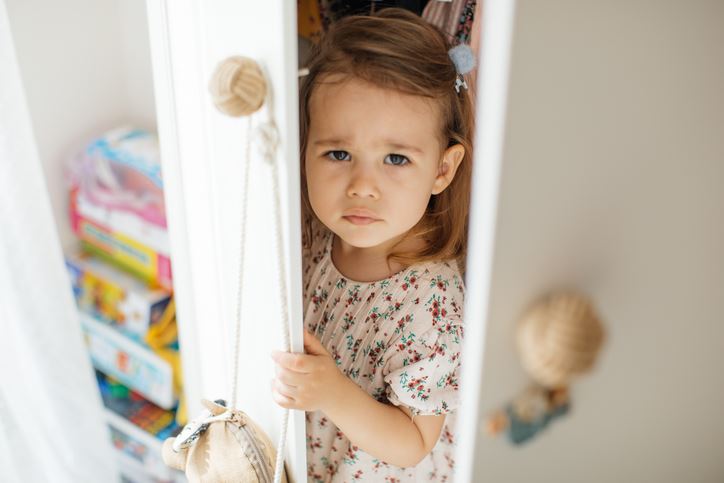Έχεις γνωρίσει παιδί που να μην έχει πει ποτέ κανένα ψέμα;
ΓΡΑΦΕΙ: The Mamagers Team - 28 ΜΑΙΟΥ, 2025

Έχεις γνωρίσει παιδί που να μην έχει πει ποτέ κανένα ψέμα; Κάποια είναι πολύ χαριτωμένα (μια πριγκίπισσα μου χτένισε τα μαλλιά σήμερα), κάποια είναι ανούσια (δεν ξέρω που είναι το μολύβι μου) και κάποια είναι πιο ανησυχητικά (έπεσα από τις σκάλες στο σχολείο/η δασκάλα μου είπε ότι είμαι ο καλύτερος μαθητής). Γιατί τα παιδιά λένε ψέματα, πώς πρέπει να αντιδράμε και πότε πρέπει να το δούμε πιο σοβαρά; Σύμφωνα με τους παιδοψυχολόγους, τα παιδιά καταλαβαίνουν τη διαφορά ανάμεσα στο ψέμα και στην αλήθεια μετά την ηλικία των 4-5 ετών. Τα μικρότερα παιδιά μπερδεύουν τα φανταστικό και το αληθινό. Μπορεί να έχουν σκεφτεί κάτι ή να το έχουν δει κάπου και να το αναφέρουν ως προσωπικό τους βίωμα και ως αληθινό γεγονός. Σταδιακά μετά την ηλικία των 4 ετών διαχωρίζουν καλύτερα την πραγματικότητα από τη σκέψη και τη φαντασία.
Γιατί τα παιδιά λένε ψέματα;
Για να καταλάβουμε οι γονείς πώς πρέπει να αντιδράσουμε σε ένα ψέμα, οφείλουμε να δούμε τις αιτίες για τις οποίες μπορεί ένα παιδί να πει ψέματα.
Μόλις έμαθαν... τι είναι ψέμα: Το παιδί ανακάλυψε το ψέμα και πρέπει να το δοκιμάσει. Πώς θα αντιδράσει η μαμά μου; Θα με πιστέψει;
Θέλει την προσοχή: Ένα παιδί που είναι αγχωμένο ή περνάει κάτι και δεν μπορεί να το εκφράσει συναισθηματικά μπορεί να πει ένα ψέμα για να τραβήξει την προσοχή, για να έχει περισσότερη φροντίδα (π.χ. μαμά πονάει ο λαιμός μου) ή λένε ένα ψέμα για να κρύψουν τι περνάνε.
Απλά δεν το σκέφτονται: Η παρορμητικότητα στα παιδιά είναι διάχυτη για αυτό δεν αποκλείεται να πουν ένα ψέμα χωρίς καν να το σκεφτούν. Με λίγα λόγια, μιλάνε πριν σκεφτούν! Σε αυτές τις περιπτώσεις, αρκεί να ρωτήσεις το ίδιο πράγμα και να του δώσεις την ευκαιρία να πει την αλήθεια!
Θέλει να ξεχωρίσει: Τα παιδιά με χαμηλή αυτοεκτίμηση λένε ψέματα για να φανούν, να ξεχωρίσουν και να εντυπωσιάσουν τους άλλους.
Λένε αθώα ψέματα: Μια δεξιότητα που μαθαίνουν από τους γονείς, συνήθως, κάποια παιδιά θα πουν ένα ψέμα που δεν βλάπτει (δεν μπορούσα να έρθω στο πάρτι σου) συνήθως για να προστατεύσουν κάποιον (κι εγώ φοβήθηκα χθες όταν φώναξε η δασκάλα).
Τι μπορούν να κάνουν οι γονείς για να σταματήσουν τα παιδιά να λένε ψέματα
Δείχνουμε στα παιδιά ότι εκτιμάμε την ειλικρίνεια. Κάθε φορά που λένε την αλήθεια πρέπει να τα επαινούμε για τη (δύσκολη, πολλές φορές) απόφασή τους να πουν την αλήθεια.
Επαναλαμβάνουμε την ερώτηση: Δίνουμε μια δεύτερη ευκαιρία στο παιδί να πει την αλήθεια (βούρτσισες τα δόντια σου;). Εάν πει την αλήθεια το επαινούμε, διαφορετικά θα πρέπει να κατανοήσει ότι υπάρχουν συνέπειες.
Έχουμε ενσυναίσθηση: Εάν το παιδί δεν μπορεί να εκφράσει τα συναισθήματά του και καταφεύγει σε ένα ψέμα (δεν πήρα το παιχνίδι του) πρέπει να σκεφτούμε γιατί το έκανε (ήθελε να παίξει και ζήλευε το παιχνίδι του αδελφού του). Τότε εστιάζουμε στην αιτία, μαθαίνουμε στο παιδί πώς να ζητάει ευγενικά και να μοιράζεται.
Οι τιμωρίες δεν λειτουργούν: Οι τιμωρίες δεν διορθώνουν τον λόγο που οδήγησε το παιδί στο να πει ψέματα, αντίθετα το πεισμώνουν και το κάνουν να νιώθει ότι "κανείς δεν καταλαβαίνει".
Ενισχύουμε τη συνήθεια της αλήθειας. Εστιάζουμε στη θετική συμπεριφορά και επιβραβεύουμε την αλήθεια με λέξεις, με συναίσθημα και με ένα φιλί ή μια αγκαλιά.
Σε ένα σοβαρό ψέμα, καταφεύγουμε στις... συνέπειες! Αντί για τιμωρίες αφήνουμε τη δυνατότητα στο παιδί να ανακαλύψει ότι για τα ψέματα, υπάρχουν συνέπειες. Αν κάθε μέρα πετάει το φαγητό του στο σχολείο και δεν το τρώει, τότε δεν του δίνουμε λεφτά για το κυλικείο. Αν ένα μεγαλύτερο παιδί δεν διαβάζει συστηματικά, τότε θα πρέπει να το ελέγχετε εσείς καθημερινά μέχρι να κερδίσει ξανά την εμπιστοσύνη σας.
ΠΗΓΗ: